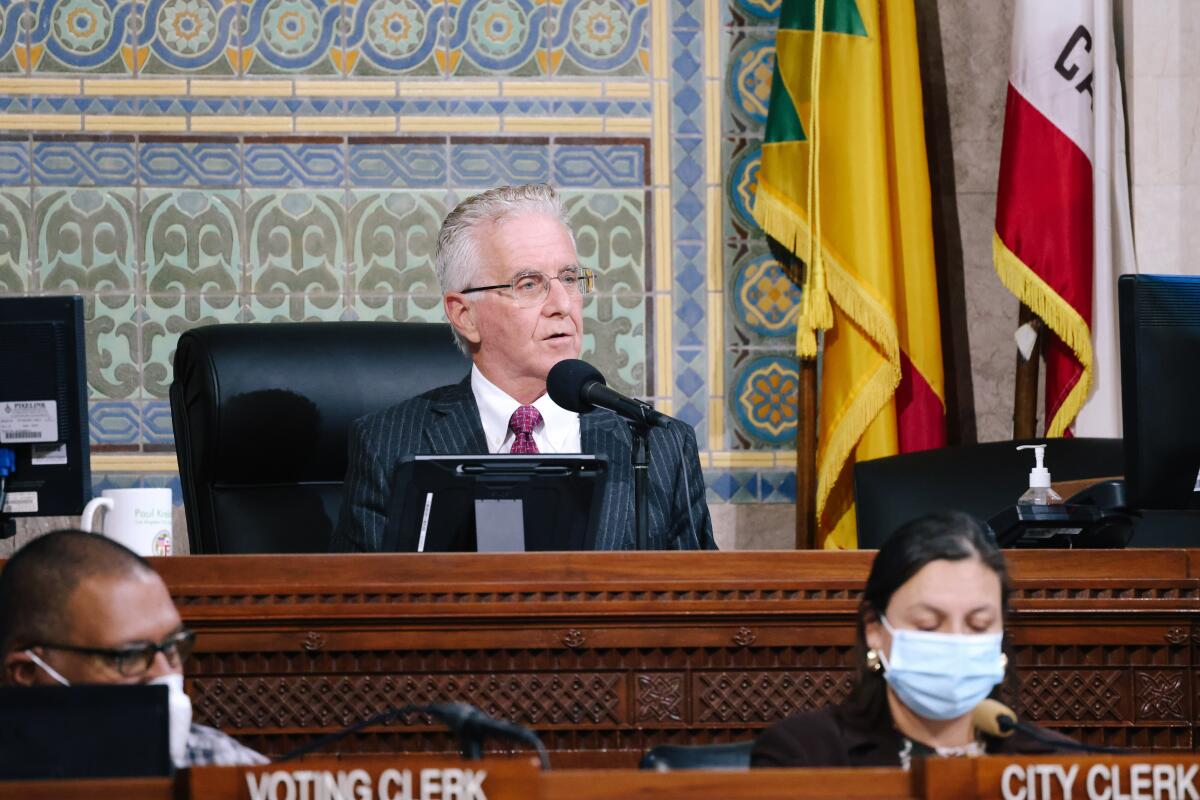L.A. City Council passes law to give retail workers with erratic hours more stability

- Share via
The Los Angeles City Council on Tuesday passed a new law that requires large retailers to give employees their work schedule at least two weeks in advance — a move designed to give laborers more certainty about their hours.
The law, known as the Fair Work Week ordinance, also requires businesses to give workers at least 10 hours’ rest between shifts or provide extra pay for that work.
Software used by retail stores can predict consumer demand, allowing employers to boost or pare back on staff. But that can mean erratic schedules for workers, labor leaders and activists say.
The new law was pushed by the labor-aligned group Los Angeles Alliance for a New Economy, or LAANE, and the United Food and Commercial Workers International Union. San Francisco, Seattle, New York and other cities have passed similar measures.
Heidy Lopez, who works at a Food 4 Less grocery store in Canoga Park, said that her work schedule “changes all the time,” making it difficult to be able to plan her week.
A national movement to mandate stable hourly schedules for low-wage workers expanded to Los Angeles on Friday, as City Council members introduced a “Fair Workweek” measure that could affect some 70,000 retail employees in the city.
She’s also had instances where she worked late and had to be back at the store by 6 a.m.— a practice of “clopening,” in which workers close a store late at night and return again in the morning to open it.
At one point, the 37-year-old was working full time at Food 4 Less, but switched to part time when her boss told her that she may need to come in on the weekends.
Stuart Waldman, president of the Valley Industry and Commerce Assn., was among those who criticized the new law. He predicted it would hurt employers because they could face penalties if a worker needs an unexpected day off, for example.
“This ordinance is a one-size-fits-all approach that was rushed through without any debate or economic analysis,” Waldman said. “This is an example of how not to legislate.”
The City Council voted in 2019 to draft the law, but passage of the final ordinance was delayed by the COVID-19 pandemic and the council’s push for grocery chains to give so-called “hero pay” to their workers.
A UCLA study released in 2018 found that 8 in 10 retail workers have fluctuating workweeks over which they have no control. Approximately 77% of retail workers receive less than one week’s notice of their schedules or changes to their schedule, the study found.
Labor activists and other supporters argue the unpredictability of work schedules makes caring for children, elderly parents and attending classes more difficult and leads to financial insecurity.
City Councilmember Curren Price said some 70,000 workers in L.A. would be affected by the law. Many of them are people of color, women and heads of household, he said.
“As we enter the holiday shopping season we are reminded of our responsibility to support and protect our retail and grocery workers, many of whom have been on the frontlines throughout this pandemic,” Price told his colleagues at Tuesday’s meeting.
Alaina Pangelina, 33, worked at retail clothing giant H&M until 2020. She said she would be scheduled for 40 hours of work during some weeks. Other weeks, her schedule dropped to 19 hours, she said.
Pangelina said she also saw workers called in unexpectedly who had to pay for an overnight nurse to care for elderly parents who couldn’t be left alone.
Get the lowdown on L.A. politics
Sign up for our L.A. City Hall newsletter to get weekly insights, scoops and analysis.
You may occasionally receive promotional content from the Los Angeles Times.
“We want to work, and we want to work more,” she said. But the unpredictability of work hours “really impacts workers’ lives,” she said.
Under the law, an employer must provide each new employee a “written good-faith estimate of the employee’s work schedule.”
Retailers must also provide an employee with “written notice of the employee’s work schedule at least 14 calendar days before the start of the work period.”
The law also requires an employer, before hiring a new employee or using a contractor, temporary service or staffing agency, shall first offer the work to qualified, current employees.
The law would apply to retail businesses in Los Angeles with at least 300 employees worldwide, which includes chains such as Target, Ralphs and Home Depot.
Employers who violate the law, which will go into effect in April, could be assessed penalties of up to $50 a day.
More to Read
Sign up for Essential California
The most important California stories and recommendations in your inbox every morning.
You may occasionally receive promotional content from the Los Angeles Times.















